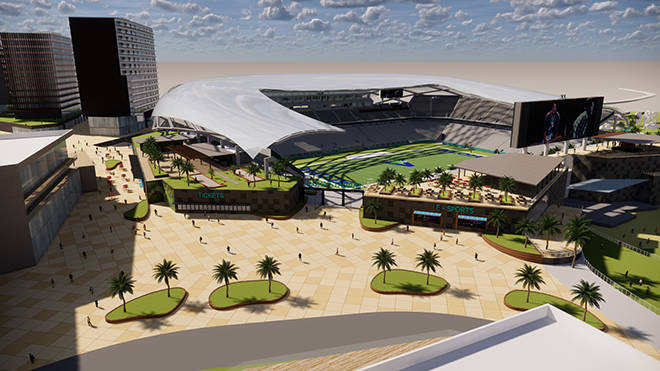If the New Aloha Stadium Entertainment Project is delayed for a year it could add “at least $20 million” to the eventual price tag, according to estimates.
“Every year of delay adds the cost of inflation to the construction cost,” said a construction industry professional with decades of experience who agreed to offer the estimate anonymously because his firm might seek business with the state in the future. He also is not authorized to speak to the subject.
Legislators said that while they are determined to see the project to continue, they expect the cost to rise significantly beyond the state’s $350 million investment and what an envisioned development partner might put in due to the failure to pass Senate Bill 2940 Thursday.
The bill, which was to have ironed out a handoff of jurisdiction from the Hawaii Community Development Authority to the Aloha Stadium Authority, died Thursday when a language flaw in the measure was unable to be rectified and agreed upon in time for the session’s adjournment Friday.
Defining the lines of authority was viewed as a key step prior to issuing a request for proposal that was to have come late this month.
Now, unless a special session is convened by Gov. David Ige or by a two-thirds vote of the houses, the measure must wait until the 2021 session.
The language issue arose because HCDA’s contracts are limited to a maximum ceiling of 65 years while NASED deals have been approved for 99 years. But an error in the bill would have made HCDA projects elsewhere on Oahu subject to 99-year agreements.
In a letter to key legislators, State Comptroller Curt Otaguro said the error was “monumental” but inadvertent.
State Sen. Glenn Wakai (D, Pearl Harbor-Kalihi) said he was unable to get Sen. Kai Kahele (D, Hilo) to accept pledges that the language would be corrected in the 2021 legislative session and HCDA would abide by the 65-year limit until then. Kai declined immediate comment.
In addition to the expected increase in construction costs, legislators say stadium management also will have to grapple with how to fund additional health and safety repairs to keep the current stadium operational until 2024 or beyond.
A $7.7 million request for deferred maintenance funds was rejected earlier in the session.
Officials were also expected to reach out to members of the six developer-led groups that had responded to the May 26 request for qualifications. The state had been due to whittle down the field to three priority-listed finalists this month who would receive the request for proposal.
Some lawmakers were concerned the rejection of the bill might hurt the state’s credibility with developers who have invested many months and dollars in the process to date and some might leave to chase projects deemed “low hanging fruit” elsewhere.
Rep. Sylvia Luke (D, Makiki-Punchbowl) lamented the demise of other provisions of the bill that would have required adding two community members from areas adjoining the stadium to the Stadium Authority and also required public disclosure documents for members of the Authority.
“It is unfortunate that the community directly impacted by the project won’t have a voice during the most important part of the project…,” Luke said.

